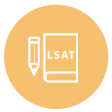LSAT Eligibility 2023 mentions all the details related to candidates’ age limit, educational qualifications and its related things. LSAT Exam Eligibility is the minimum requirement that the candidates should qualify to apply for this exam. The candidates who are appearing in the upcoming LSAT 2023 must check the official LSAT Eligibility to avoid the last-minute cancellation of their candidature.
LSAT Exam Eligibility 2023 is officially declared by Pearson VUE. As per the LSAT Eligibility 2023 age is not a bar to appear in this exam. Additionally, the academic qualification in LSAT India Eligibility also varies from college to college. Here, we have given all the details regarding LSAT Eligibility, which you must check before proceeding with exam registration.
Table of content
What is LSAT Eligibility?
The candidates may know that every year LSAT India Eligibility is given out by Pearson VUE and it should be their first priority to check all the details related to this before applying for the exam. The official LSAT Eligibility contains all the details related to age limits and academic requirements.
Before filling in the LSAT 2023 application form, the candidates must check the eligibility criteria in detail. Note that if you fail to fulfil any of the LSAT Eligibility, then the authority will reject your application, although you are in the final stage of the selection process. Each participating institute has its own LSAT Eligibility criteria, which are also different with respect to the candidate’s category. Note the section below and get all the details regarding LSAT 2023 Eligibility and more.
LSAT India Eligibility Highlights
It is seen that there are no such specifications in LSAT Eligibility 2023, as mentioned by the authority. However, candidates should fulfil the eligibility criteria for LSAT Colleges to study law at UG and PG levels.
|
Course |
LSAT Eligibility Criteria |
|
Five-year integrated LLB course |
Candidates should have cleared Class 12 or equivalent exam |
|
Three-year LLB course |
As per LSAT Eligibility, the candidates must hold a bachelor’s degree in any stream from a recognised university/ college. |
|
LLM |
As per LSAT Eligibility, candidates must hold a law degree, i.e. LLB degree from a recognised university/ college. |
☛ See Also: LSAT Syllabus
LSAT Age Limit
There is no specific mention of the age limit as per the official LSAT Eligibility 2023. Candidates beyond their ages can apply for this exam if they have the basic educational qualification. But, you should check LSAT Eligibility for individual colleges, as the college administration may set their own requirements based on the available seats.
LSAT Eligibility for Academic Qualification
LSAT India does not have any specific educational eligibility. Considering the LSAT Eligibility 2023, candidates are given admission based on the scores varying from institute to institute. So, before appearing in the exam, students are advised to check the LSAT Eligibility criteria of their desired college to which they wish to apply. If, after registration, they are found ineligible for admission, then no test fee will be refunded, and their candidature will be cancelled automatically.
LSAT Eligibility for Different Law Courses
Here, we have listed the courses-wise LSAT Indian Eligibility. Check all these course-specific criteria before applying for the upcoming exam.
LSAT 2023 Eligibility for BA LLB (5-year Integrated course)
Students applying for the BA LLB Program (5-year Integrated course) must have qualified for the 12th standard from any other recognized board. As per the official LSAT Eligibility 2023, students must have scored a minimum passing percentage of 45%, or it may vary for each participating institute.
LSAT Eligibility for LLB course
As per the official LSAT 2023 Eligibility, to get admission in the LLB course, students must possess a Bachelor’s degree from a recognized institute with a minimum of 45% aggregate marks in their qualifying exam. It is recommended that the candidates must check the official website of the respective colleges for more details.
LSAT India Eligibility 2023 for LLM course
Applicants applying for LLM courses must hold a 3-year or 5-year LLB degree from the recognized Law Colleges in India as per Bar Council of India norms. Candidates must score at least 45% marks aggregate in the LLB course, or the passing percentage may vary as per the participating institute.
College-Wise LSAT Eligibility 2023
Note the table below to get some basic information about college-wise LSAT 2023 Eligibility.
|
Name of the College |
LSAT Eligibility |
|
Rajiv Gandhi School of Intellectual Property Law |
Students must have completed a Bachelor of Law (5 years) in first-class from any recognized university. Or As per LSAT Eligibility, applicants with an LLB (Honours) degree in Intellectual Property from IIT Kharagpur with a CGPA of 8.5 can apply directly for admission. Or Bachelor of Law (3 years) in first-class from a recognized university along with a Bachelor’s degree (not less than 3 years) in Humanities/ Science/ Commerce or Equivalent. |
|
Jindal Global Law School |
Candidates who cleared the 12th examination with a minimum of 45% marks and their age must be below 22 years are eligible for admission. Those who have completed 3 years of graduation degree with a minimum of 45% marks with no age limit can apply for admission. |
Important Points on LSAT 2023 Eligibility
Note the below points to some important points for LSAT India Eligibility 2023.
- Every participating law school will have a different set of LSAT Eligibility criteria. So you must check with the individual institutes on their latest eligibility requirements.
- Some degrees are not recognized by the LSAC. So check the list of recognized degrees before you apply.
- Ensure that you meet the LSAT Eligibility of the individual law colleges you are applying for before you sit for the exam.
- The LSAT is required only to study law abroad. To study law courses in India, you will need to give the LSAT India.
- There is no restriction on the number of attempts as per LSAT Eligibility. You can take the LSAT exam as many times as you want.
- Those who have worked as a staff member (test supervisor or testing staff) at an LSAT test centre within the last 24 months are not eligible to appear in the exam as per LSAT Eligibility.

 Install
App
Install
App




